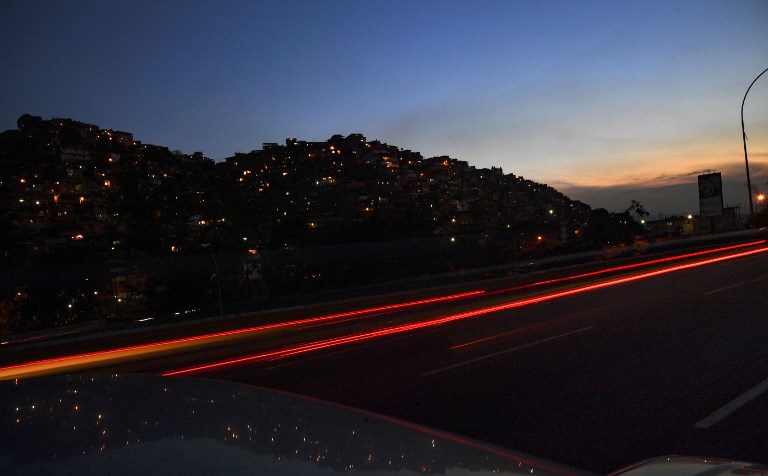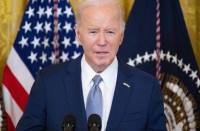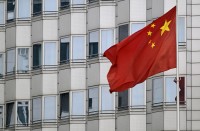
by Marc BURLEIGH / Esteban ROJAS
CARACAS, Venezuela (AFP) — President Nicolas Maduro blamed “terrorists” for a new, near-nationwide blackout that gripped Venezuela Tuesday, two weeks after a similar outage caused deaths and chaos.
In a statement on Twitter, Maduro said a deliberately set “large-scale fire” hit facilities around the Guri hydroelectric plant in the south of the country that supplies power to 80 percent of Venezuela’s 30 million inhabitants.
Another operation by “criminal hands” knocked out transformers as repairs were going on, he said. He alleged the “sly terrorist attacks” had the goal of “destabilizing” the country.
His communication minister, Jorge Rodriguez, tweeted images of electrical installations consumed by flames, while the government extended from 24 to 48 hours a no-work and no-school period ordered to take the load off the grid.
Vice President Delcy Rodriguez announced on Twitter that Maduro had decreed schools and workplaces would remain closed until Wednesday night, “based on the scale of the damage.”
The first blackout, between March 7 and 14, resulted in more than a dozen hospital patients, including those needing dialysis or intensive care, dying, and desperate citizens turning to sewer outfalls to get water.
On Tuesday, Caracas and other cities were paralyzed once more. Public transport and water supplies were disrupted. Buildings without generators — including many hospitals — were plunged into gloom. The main international airport operated in the dark, with desk agents doing check-ins by hand.
Streets were largely empty. There were lines in the capital for the very few buses running, but subway stations were closed, the underground trains stalled on their tracks. Shops were shuttered.
“Nothing is working. During blackout days you can’t do anything at all. There’s no internet, no access to cash,” with automatic teller machines blanked out, said Yendresca Munoz, a 34-year-old bank analyst living in Caracas.
The latest outage began in the middle of Monday, rekindling fear and frustration in Venezuelans who endured the last outage.
NetBlocks, an organization that monitors the internet, said it had detected a “severe impact” to the telecoms network across 18 of Venezuela’s 23 states.
A degraded grid
In the last blackout, Maduro also had said the Guri plant was targeted. Then, he accused the United States of launching a “cybernetic” attack against it, and accused the opposition of being behind acts of “sabotage.” He promised to protect infrastructure with a specially created military unit.
Analysts said that while a US attack was possible it was unlikely, adding that years of underinvestment, poor management and corruption was the more likely culprits.
This time, Maduro’s government again pointed the finger at the opposition.
But opposition leader Juan Guaido — recognized as Venezuela’s interim president by the US and its allies — rejected that as unbelievable.
“They are not giving any sensible, credible explanation,” he said. “When it’s not a ‘cyberattack’ or an ‘electromagnetic pulse’ it’s ‘sabotage,’ despite them militarizing more and more the electricity stations.”
He said he had information from workers in the state electricity company Corpoelec that some transformers had overloaded.
In the streets, Venezuelans appeared midway between rage and resignation.
“This is too much,” said Leo, a 19-year-old employee in a Caracas restaurant that was forced to close as its fridges warmed up. “The meat and chicken — all the food is rotting. It’s a total loss.”
Government mocked
Venezuelans still able to go online vented their frustration by mocking the government’s allegations.
“Who are they accusing this time? ET?” went one tweet.
They “are going to announce that a UFO sent by Trump and Venezuela’s right-wing launched an electromagnetic attack with extra-galactic weapons,” said another.
One parody image posted online depicted the Guri dam being assaulted by a giant octopus.
For ordinary Venezuelans, the successive power cuts were one more indignity in a country where food and medicine have become scarce, the money decimated by runaway inflation, and the political system locked in a power struggle.
While some Venezuelans expressed hope that US backing for Guaido might bring change, a geopolitical tussle over impoverished but oil-rich Venezuela suggested it would not come quickly.
Russia, Maduro’s main ally and one of its biggest creditors along with China, on the weekend sent 100 troops and military equipment aboard two flights to Caracas.
Moscow said it was done in “full respect for (Venezuela’s) legal norms” and to head off what it described as a US-organized “coup.”
Washington has hit back, warning that it would not “stand idly by as Russia exacerbates tensions in Venezuela.”
Guaido, addressing the opposition-run National Assembly, said: “It seems (Maduro’s government) doesn’t trust its own troops, because it is importing others … once again violating the constitution.”
© Agence France-Presse







